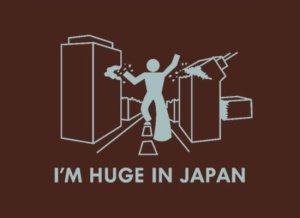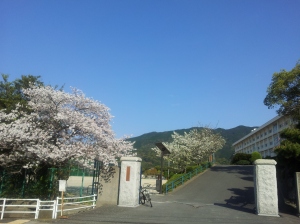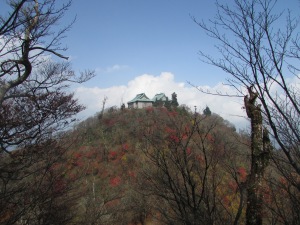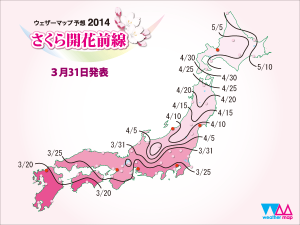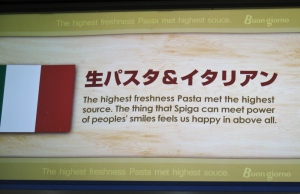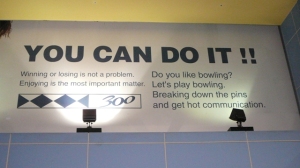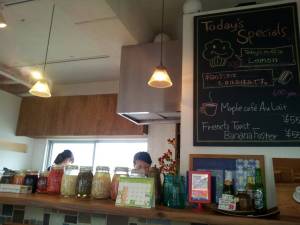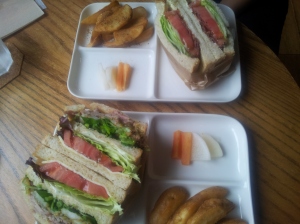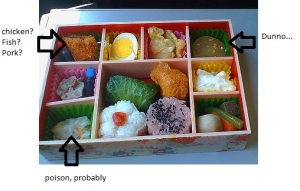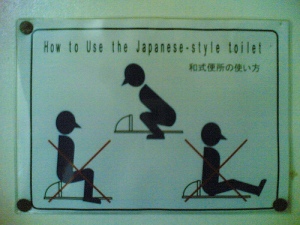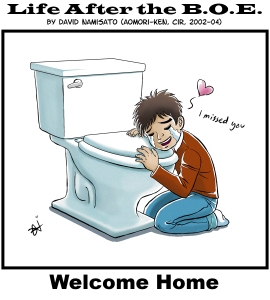1- Customer service
You have never experienced customer service like Japan’s. Every visit to a convenience store, post office or restaurant makes you feel like you’re just about the most important person in the world.
It was a shock, when I visited home last summer, to see Aer Lingus’s flight attendants. I had always thought they were the final word in customer service, boy was I wrong.
I remember feeling vaguely offended by the bored look on the F.A.’s face as she ran through the seat-belt demonstration for the umpteenth time.
I actually had to stop myself, and remember that I’m a grown up, and I should know how to operate a seat-belt, and that her reaction was perfectly normal.
2- Views like this
Seriously, this is my school
My town
and a temple on a nearby mountain
Right now, it’s cherry blossom season in Japan, and streets, parks and mountains are covered in the little pink leaves. Japan is obsessed with cherry blossoms, so much so that they put out maps, with dates of when the blossoms are going to be at their most beautiful.
3- Napping at work
As I write this, I’m on a bit of down-time at work. The last term is over, and the spring term is still about a week away. Most of the curriculum for the coming school term has been decided, arranged and timetabled… which means it’s nap time!
And this is at a senior high school no less. But why do my co-workers and I get to nap? Because it’s Japan of course!
In Japan, not only is it ok to nap at work, but it’s actively encouraged. If people are seen to be falling asleep at their desk back home, we assume that they had a rough night and are barely fit to work. Over here, however, they view these desktop dreamers as being so devoted to the job, working so hard, that they physically can’t stay awake.
Sometimes, people will even fake being asleep so it seems like they’ve been working harder.
4- working out what the ‘Engrish’ means…
Ah Engrish, I love you really. Once I got past your incredibly confusing packaging for eating my…I learned to love you
Seeing posters, shop names, slogans and other things written in Engrish lights up my day, and if there are a few foreigners around, trying to work out what these signs mean, is a great way to pass the time if you’re stuck in traffic
(what exactly is ‘Hot Communication’?)
5- Finding something awesome tucked away down dark alleys
Usually, if somebody says that they had a good time down some small alley in the middle of town, it’s time to back up and exit the conversation
But Japan, with it’s confusing, higgledy-piggledy streets, and tiny restaurants and cafes, is something of an exception. Last weekend for example, I discovered a tiny little sandwich shop near Nagasaki’s train station.
Only open from 11:00-16:00, café on the route caters strictly to the lunch crowd, and serves up, what are, without a doubt, the best sandwiches that I have had in Japan.
The owners are a funny bunch, using simple enough English, which most Japanese people can understand, while also attracting English-speaking customers. The stairs up to the café proclaim ‘only six more steps to sandwich’, while the notice-board has little cartoon additions every day.
And the food! Just see for yourself
1- Finding raw egg in my food
Unfortunately, for all the awesome dietary discoveries, there are also bad ones. I’m not a fan of eggs at the best of times, but Japan has an odd obsession with raw eggs. They even have a dish called ‘’ or ‘parent and child’. This refers to the fact that just prior to serving, a raw egg is cracked over the rice and chicken, (hence the name: ‘parent and child’) leaving the egg to cook, using the heat of the meal.
I’ve also found eggs hiding beneath sauces in my curries before! It’s gotten to the point where I’m scared to order food in a restaurant in case it secretly comes with a raw egg.
They even put it on that most sacred of dishes: Pizza
GODLESS HEATHENS!
2- Doing the ‘what’s this?’ sniff.
Have you ever been in a restaurant, seen something beside your real food, and wondered: ‘what the hell is that?’ Well, come to Japan, and you can experience that at every meal!
In the end, you have no choice to break out that old reliable instrument, the nose.
Oh how I long for the simplicity of spudz!
3- Toilets
Oh god. The horror! How are you supposed to use that?
Gross! No wonder plenty of visitors to Japan react like this:
I can hardly wait

